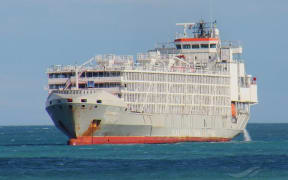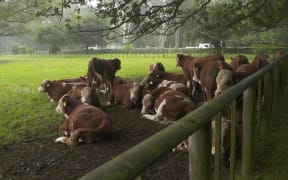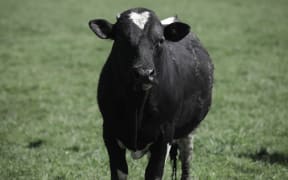The government has announced a ban on live cattle exports by sea, with a two-year period to phase out the trade.
Watch the announcement here:
Agriculture Minister Damien O'Connor launched a review into livestock exports nearly two years ago with options ranging from improving systems to a total ban.
Figures from Stats NZ show more than 100,000 breeding cattle were shipped to China last year, to the value of $255.89 million. In an announcement this morning, O'Connor said New Zealand had to uphold its reputation for high standards of animal welfare.
"The export of livestock from New Zealand has been a feature of our farming system for a long time ... but concerns about the risk to New Zealand's reputation from this trade have been steadily increasing...
"The fact is, once animals leave New Zealand by sea we have very limited ability to ensure their wellbeing before they reach their destination ... that is an unacceptable risk to New Zealand's reputation.
"We must stay ahead of the curve in a world where animal welfare is under increasing scrutiny."
He said the decision would affect some farmers, exporters, and importers and a transition period would enable the sector to adapt.
O'Connor said officials had talked to key trading partners about the decision and said he recognised the importance of maintaining those trade relationships.
"We're committed to working with them as we transition away from the shipment of livestock. New Zealand has an opportunity to boost trade through our cutting-edge scientific work into dairy cow genetics and germplasm use."
Live exports by sea represent approximately 0.2 percent of New Zealand's primary sector exports revenue since 2015 and O'Connor said while it had benefits for some farmers it's was not universally supported in the industry.
Connor said he did not expect a direct hit to the GDP as a result of halting the trade.
"Those animals will stay here in New Zealand and our reputation is to be the most ethical producers of livestock protein in the world is something we are working to build value from and I think we can, and I think this will actually play positively into our international reputation."
"There is split opinion about its long-term value and how it fits with the story we want to tell internationally to consumers. In its review submission, the independent National Animal Welfare Advisory Committee (NAWAC), which advises ministers on animal welfare issues, advised that the practice should stop."
Some animal welfare advocates, including a former head of animal welfare for the Ministry for Primary Industries, have called for an end to the trade - saying the cattle ended up in poorer conditions than they would have experienced had they remained in New Zealand.
The ban does not apply to animals moved by air.
"Clearly the periods are far shorter and generally they are well looked after. We have not had any indications of concerns about animal welfare for animals moved by air."
The two-year transition period for the industry would allow those involved time to wind down their trade and adjust their operations.
A transition period was only fair, O'Connor said.
"We appreciate that there is an existing trade, we have a system that has been built around the export. We've done a lot to improve conditions on ships. Ultimately it's the risk to our reputation of an ongoing trade.
"We do accept there is risks on every shipment to go out... but we do have to allow a transition period for industry.
"We understand there's a significant investment in some operations ... but the reality is they put New Zealand at risk as soon as [livestock] get on a ship."
Exporters outraged
A group representing some exporters, the Animal Genetics Trade Association said the decision to ban exports of livestock for breeding was morally and practically unjustified.
Spokesperson David Hayman said the cattle being sent to China were largely surplus dairy stock that would've otherwise been sent to the works in New Zealand. He said 150,000 surplus calves would now be slaughtered in New Zealand each year, rather than moved to other countries to contribute as breeding cows.
"This is an ill-informed, massively consequential decision for the nation, to earn short-term political brownie points from a few activists," Hayman said.
"More than 5000 farmers will be directly worse off. They need options to maximise stock value and reduce wastage. They lose a vital revenue source that helps them offset lost earnings from bad drought years, low beef prices, and increased compliance costs."
The industry would use the two-year period before the ban comes into effect to remind the government of the moral and economic importance of the trade to New Zealand, O'Connor said.
O'Connor said the government had not received any reaction from other countries. It had notified Australia and China.
Animal welfare groups happy
Animal advocacy group SAFE said the ban meant animals would no longer suffer in countries with lower standards of animal welfare to New Zealand's.
SAFE CEO Debra Ashton said the organisation was pleased the prime minister and minister for agriculture had listened to the thousands of Kiwis who had spoken out about the issue.
However, SAFE continued to be seriously concerned about animals that would continue to suffer for the next two years during the phase out, she said.
The SPCA said it was delighted at the government's announcement.
SPCA Chief Executive Andrea Midgen said it would have strongly preferred a shorter transition period, however, it appreciated the delicate and difficult balance between animal welfare and the economic and contractual considerations of those farmers and exporters involved in the trade.
Midgen said media coverage of numerous disasters in which exported animals had suffered or been killed had resulted in overwhelming public support for the ban of live exports.
"We know that New Zealanders are appalled by live exports and we are thrilled the government have listened to the experts, scientific evidence and the general public. It's an historic moment for animal welfare in New Zealand," she said.





